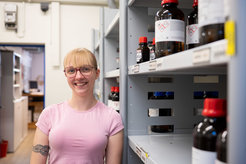Minerva's daughters are passionate about logistics and chemistry
Why the warehouse is a stroke of luck for Doreen Stehlik – and how she contributes to gender equality at the institute
Blue eyes, blonde hair, and a disarming friendliness. Most colleagues on campus likely know Doreen Stehlik, who has been working in the warehouse since March 2023. Doreen is outgoing and enjoys contributing to projects like the Night of Training or Girls’ Day. Since the beginning of the year, she and Julia Jacobs have formed the Gender Equality Team.

The 24-year-old joined the institute two years ago to combine her passions – logistics and chemistry. She tells us why her job has been a lucky break in this Minerva’s Daughters interview.
What brought you here? Tell us about your path to the Kohlenforschung!
Doreen Stehlik: I ended up in my current job through a few detours. After finishing school, I originally wanted to study law. But I was always drawn to chemistry, and when I discovered the Chemistry with Materials Science degree program at the Bonn-Rhein-Sieg University of Applied Sciences, I enrolled on the spur of the moment and moved to Bonn. I was fascinated by research and was sure I’d go all the way – maybe even become a PhD student one day. But during my bachelor’s thesis, I experienced firsthand that research often involves setbacks, and we couldn’t achieve the results we hoped for. My enthusiasm waned. I decided not to pursue a master’s degree and had to completely rethink everything. That was a difficult time – but a job in the storage unit of a Mülheim-based retailer sparked a new passion in me: logistics. And a job posting at the MPI led me to the Lager.
What are your responsibilities at the institute, and what does your workday look like?
Doreen: We start the day with solvent filling. Every day, up to 200 liters of acetone, isopropanol, and other solvents are prepared in containers for the laboratory tower. We also supply the MPI CEC – though only up to 100 liters per year (she laughs). Then there are deliveries from DHL, Air Liquide, Transoflex, and we start unpacking the chemicals and, of course, serving our "customers." I especially enjoy handling the sample shipping. This requires a lot of chemical expertise, which I bring from my studies. We need to know exactly how various gases and solids must be handled and documented. Many samples are dropped off at the storage facility where the researchers themselves aren’t even sure what exactly they’ve produced – but we are responsible for ensuring everything is shipped safely. I want to deepen my knowledge here and am looking forward to taking on more responsibility soon as the official dangerous goods safety adviser.
What influenced your career choice? Did/do you have role models?
Doreen: I don’t really have clear role models. For me, the decision was more about knowing what I didn’t want. Seeing people in my circle unhappy with their jobs made me determined not to end up in the same position. I chose my job at the MPI very carefully. I’m really satisfied and feel like we have a great foundation here for working together respectfully and equally.
Speaking of equality – you’re also the deputy gender equality officer. Do you feel there’s still work to be done to achieve equal working conditions?
Doreen: A key factor here at the MPI that enables equal work is that we follow the rules of the collective agreement for public service (TVöD). The agreement applies equally to all employees regardless of gender, which already provides a solid foundation. Also, our storage team is perfectly balanced – and everyone does everything, which makes sense for the tasks at hand.
In your point of view - what is your task in the Gender Equality Team?
Doreen: We’re still in the exploratory phase and talk a lot to figure out what we want to do and how. We’re responsible for gender equality and I believe it's important to first analyze the current situation in detail. For instance, if the percentage of women in senior positions declines starting at the postdoc level, I would like to know how many women actually apply for these roles. Women tend to apply to advertised positions, but the research departments often do not publicly positions for PhDs and postdocs. This is one point, I will take a closer look at. For the moment, we’re excited to revive the Minerva Movie Nights as a contribution to the institute’s culture and hope it will be well received.
What do you wish for the institute?
Doreen: I hope that the gender equality team can help foster a positive environment at the institute – through inspiration, offerings, and contributions. As paradoxical as it sounds: if we don’t need that many separate programs for women, in my opinion that’s actually a good sign – it means that both women and men feel equally comfortable here.






